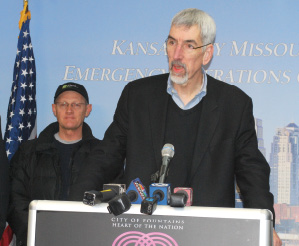
Mayor Mark Funkhouser addresses the blizzard of 2011. Leslie Collins
By Leslie Collins
Northeast News
Feb. 9, 2011
Kansas City survived.
It didn’t barely escape the blizzard of 2011, but deftly adapted.
“Everybody said this was the storm of historical proportions,” Kansas City Mayor Mark Funkhouser said of the Jan. 31 and Feb. 1 blizzard during a Feb. 2 press conference. “Considering the magnitude of the storm, we came through this remarkably well.”
In two days, city crews plowed 15 million cubic feet of snow, he said.
On Feb. 1, Funkhouser declared a state of emergency for Kansas City but lifted that status during the press conference.
Although at least a dozen Kansas City ambulances succumbed to the slick snow, the city worked together to minimize the problem, he said.
When an ambulance became stuck, the crew would contact Kansas City’s Emergency Operations Center (EOC) and EOC would immediately dispatch another ambulance, along with a four-wheel drive fire department truck and other vehicles.
Usually the first ambulance was able to maneuver out of the slick spot, but on four or five occasions the second dispatched ambulance was used.
However, all patients were transported to the hospital in a timely manner and patient care was not impacted, Funkhouser stressed.
During the blizzard, approximately 10 to 12 inches of snow fell in Kansas City, but other parts of the state received more than 20 inches of snow.
At times, the snow fell at two to three inches per hour and wind gusts of 35 to 40 miles per hour caused near zero visibility conditions.
For the first time in history, Interstate 70 was shut down statewide, due to the hazardous conditions. Officials also shut down Interstate 44 from the Oklahoma border through Springfield.
This is only the fourth time in Kansas City’s history since 1888, that the city has had three separate calendar days with six or more inches of snowfall during the winter season, according to the National Weather Service.
Mayor thanks city employees, residents
Funkhouser commended both city employees and Kansas City residents for pulling together during the storm.
Neighbors helped neighbors and residents heeded warnings to stay inside, he said.
Timely snow removal resulted from planning ahead, training, money and time, he said.
Although many called the blizzard a “non-event” for Kansas City, Funkhouser defended the city’s employees.
“It’s a non-event because of the work, because of the effort,” Funkhouser said.
Kansas City Fire Chief Richard “Smokey” Dyer added to Funkhouser’s statement.
“When you’re not prepared, that becomes a major event,” Dyer said. “When you activate, coordinate and plan ahead, that’s when it becomes a non-event.”
Interim Kansas City Manager Troy Schulte thanked Kansas City residents for staying off the roads and for parking on one side of the street to aid in better snow removal.
“The residents were partners with us,” Schulte said.
Asked how the storm impacted the city’s budget, Funkhouser said those figures are still being calculated. However, he said, there are “adequate” monies in the city’s contingency and reserves funds to cover the cost.
Missouri to receive federal aid
Gov. Jay Nixon requested an emergency declaration for the entire state of Missouri from President Barack Obama on Feb. 2.
The next day, Obama approved Nixon’s request, which allows the state to receive a 75 percent federal funding reimbursement to aid in the cost of responding to the snowfall that affected nearly the entire state beginning on Jan. 31.
The snow storm “burdened local jurisdictions and the state with tremendous response costs” and caused an “historic statewide response,” Nixon said.
The approved emergency declaration will also allow the Department of Homeland Security and the Federal Emergency Management Agency to coordinate disaster relief efforts.














